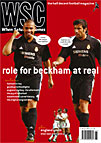 Uli Hesse-Lichtenberger investgates the scandal engulfing the Bundesliga
Uli Hesse-Lichtenberger investgates the scandal engulfing the Bundesliga
A week after All Fools’ Day, Franz Beckenbauer made international headlines. He said Bayern Munich would apply for membership of Serie A should the Bundesliga penalise the club for a clandestine contract with the Kirch Media Group. That, of course, was a typical Kaiserism, the kind of irreverent remark Beckenbauer is known for, but it reflects a serious dispute that began four years ago.
In late 1999, the German FA (the DFB) were negotiating a new TV contract for the Bundesliga with Kirch Media. Responsible for the deal were the DFB’s Gerhard Mayer-Vorfelder and Wilfried Straub. Their main problem was that Bayern, Dortmund and Leverkusen wanted to end collective bargaining and strike their own deals. Other clubs feared this would leave them only crumbs.
However, Bayern suddenly decided to place common good above greed, for when a vote was held only Dortmund opposed collective bargaining. Mayer-Vorfelder and Straub got down to business and did so with the help of an adviser – Bayern business manager Uli Hoeness. On April 29, 2000, the DFB signed a four-year deal with Kirch, worth DM3 billion (£1 billion).
The negotiations with Kirch were led by the DFB, because this venerable amateur organisation then still ruled the whole of German football. However, by late 2000, the 36 professional clubs had forced the DFB into allowing them to form an association and govern the top two divisions themselves. This association created a company for its day-to-day business called Deutsche Fussball Liga (German Football League), or DFL, run by four executive directors, among them former DFB man Straub.
In February 2003, it emerged Bayern had signed a marketing contract with Kirch Media on December 9, 1999, worth £64 million over four years, of which the club netted £14m before Kirch went into administration. The date strangely coincided with Bayern’s change of opinion regarding collective bargaining, raising suspicions Kirch had bribed the club into not vetoing the deal, especially since they never used the rights they were paying for.
Even more problematic was the fact Bayern had kept this contract secret. Each year, clubs have to apply for a licence for professional football by opening their books and disclosing their business ties. Concealing facts constitutes a grave breach of league regulations, normally punished by fines, deduction of points or the revocation of the licence (meaning automatic demotion to amateur football). Yet Bayern had kept the bodies controlling this procedure (first the DFB, then the DFL) in the dark for three years running.
This started the investigation which led Beckenbauer to propose an Italian exile in case of a penalty, as he and Bayern painted themselves as wrongly persecuted innocents. Hoeness insisted nobody had been bought and claimed the contract was kept secret at Kirch’s insistence. He also said: “We have 150 million marks in the bank. We are the richest club in the world!” Which was another way of saying Kirch’s money wouldn’t have made any difference as far as the licence was concerned.
That, however, missed the point, and Bayern must have realised this, because in April they offered to pay €3m (£2m) to charity for the DFL to forget about the whole mess. The DFL’s directors weren’t happy about the charity bit, and on April 11 the two parties reached a settlement: €3m, but not more than a third for children in Iraq.
This seemed a very strange solution, because as Dortmund’s president Dr Niebaum said: “Either Bayern are guilty, then three million euros is nothing, or they aren’t guilty, then why pay anything?” But before that question ever became a topic, prestige intervened and shifted the focus: 24 hours after the settlement, the DFL issued a press release that called Bayern’s behaviour “morally reprehensible”. Now Bayern’s representatives were livid, and Karl-Heinz Rummenigge said there were people within the DFL “who want to come the strong man” by verbally retaliating after a settlement had been reached. A day later, Bayern withdrew their representatives from various minor committees and boycotted the DFL’s general meeting.
But pouting won’t help. The main repercussion of this confusing affair is the lingering feeling that Bayern are operating in a different league, not only because they are running away with the title. When they travelled to Dortmund a week later, there was an either ironic or mocking banner in the Bayern stand. It simply read: “Lazio Juve Milan.”
From WSC 196 June 2003. What was happening this month